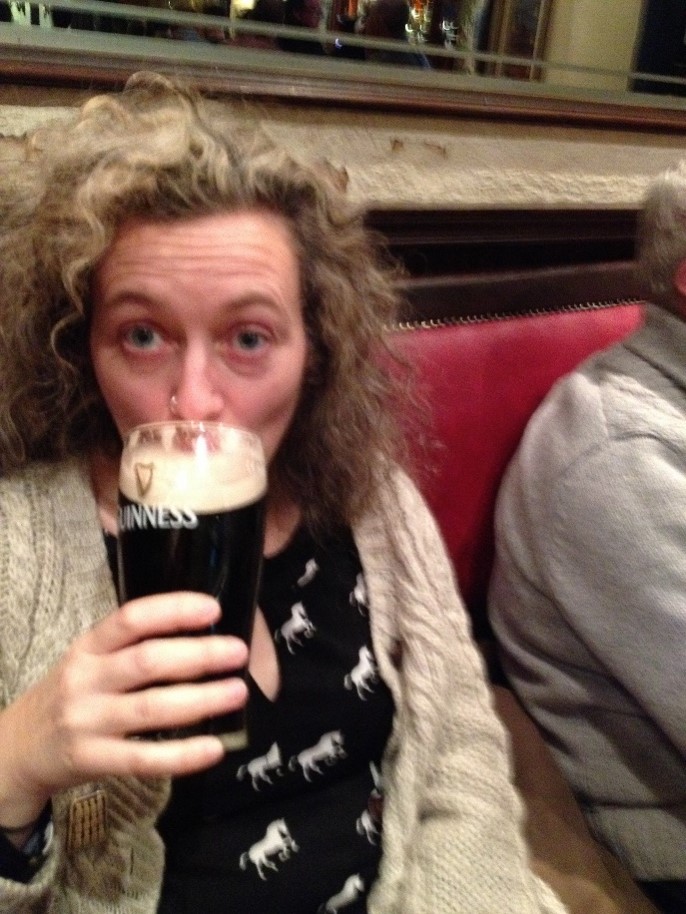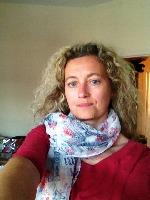Rachel MacGregor is a Digital Preservation Officer at the Modern Records Centre, University of Warwick.
26th March 2020 – I was just finishing my first full week of working from home (I’m still here) and it felt very far from normal, particularly because I should have been in Dublin speaking to colleagues from the Archives and Records Association Ireland about digital preservation. I had been really looking forward to my trip there not least because it’s a city I’d like to see more of having only been once before. That will have to wait for the time being (although Dublin – you have been warned!).

Me in McDaid’s bar in Dublin in 2013. I’ll be back!
However my Irish colleagues were not so easily put off by a little thing like a pandemic and on 12th August I was in virtual Dublin (the craic is not quite as good) addressing an audience of around 80 or so archivists from Ireland (and beyond!). They were kind enough to take time to listen to me talk about my experiences of using Open Source software in digital preservation and I was delighted to hear from Peter Clarke from University College Dublin about their technical infrastructure (which is very impressive). Many of those on the call commented that they would not or could not have attended the original event that would have been in person in Dublin. Ireland is a relatively small country but many cited the issues with travel and the time needed away from their offices as why they would not have made it. For most of us, limited resources in organisations where you might be the only person who has any responsibility for digital preservation means that in the past access to training could be difficult. However suddenly we find ourselves in a situation where training and conferences are appearing entirely online and access is opened up with just logging on (and in some cases getting up very early in the morning!).
I’ve been invited to speak at a number of training or information sharing events which I hope participants found useful and have organised a couple myself as well. I’ve learnt from speakers as varied as Dr Safiyah Noble of UCLA talking about the how the algorithms which underpin the ways we search and navigate data (including institutional library and archive searches) perpetuate and support oppression. I’ve been delighted by Chalida Uabumrungjit from the National Film Archive of Thailand talking about audience engagement with their 1950s film of the last trams of Bangkok
a view on the world which for me is wholly unknown but fascinating. And I’ve been taken back in time to a for more familiar past by Andrew Davidson from Robert Gordon University introducing us to Fraserburgh on Film, documenting the lives of a remote rural community in Scotland
not an area I know but had some echoes of the rural community in which I grew up. What unites these diverse speakers is their passion for upholding those things that are important to all of us and how data and information can be used or abused to oppress or to bring people together in difficult times. The information we manage has the power to unite and empower people and those of us engaged in preserving and managing that information have the responsibility to enable this and ensure the information is used for good.
Having logged out of the zoom meeting where brilliant people share their exciting work it can be a bit of a bump back to the mundane reality of day to day life in a pandemic. There are many moments this year when like many others I have felt extremely isolated: isolated from friends and family and also from colleagues and the institution I work for. Sitting in my bedroom processing digital files coming from the University’s day-to-day business can feel a long way from either the powerful community engagement work which is going on or being at the frontline of ensuring data around Covid research is shared and made available as widely as possible. However, ensuring that accountability is served is a critical role and gets to the very core of what we should be aiming at. This is articulated well and at length by a great blog post by Eira Tansey of the University of Cincinnati which helped me a great deal in focussing on the core nature of my role. By laying the foundations of accountable and sustainable preservation practice we enable the work of preserving community memory and bringing people together through this.
So let’s share our work, inspire each other and keep saving those bits.
